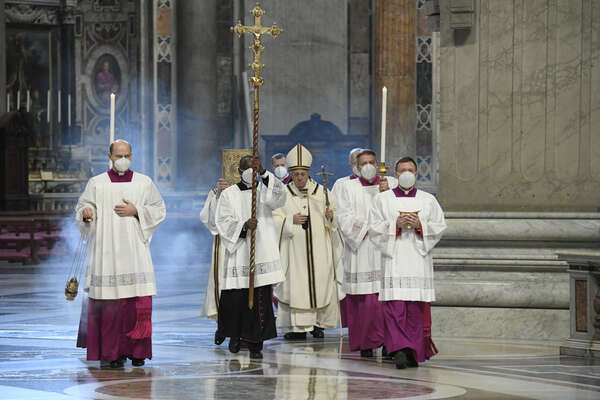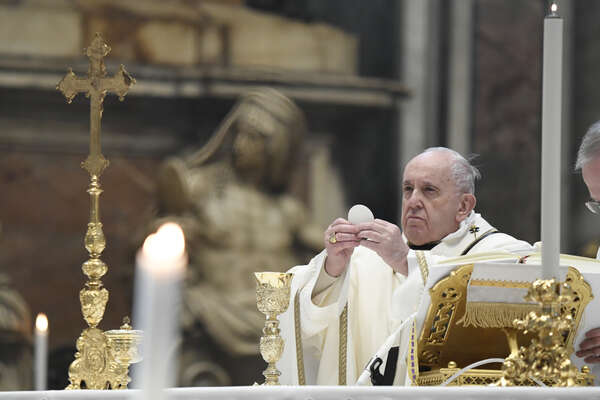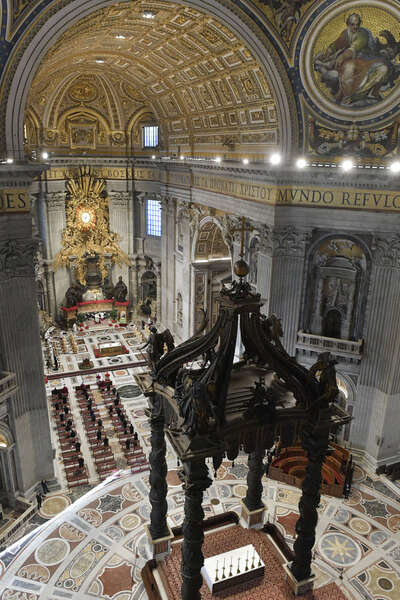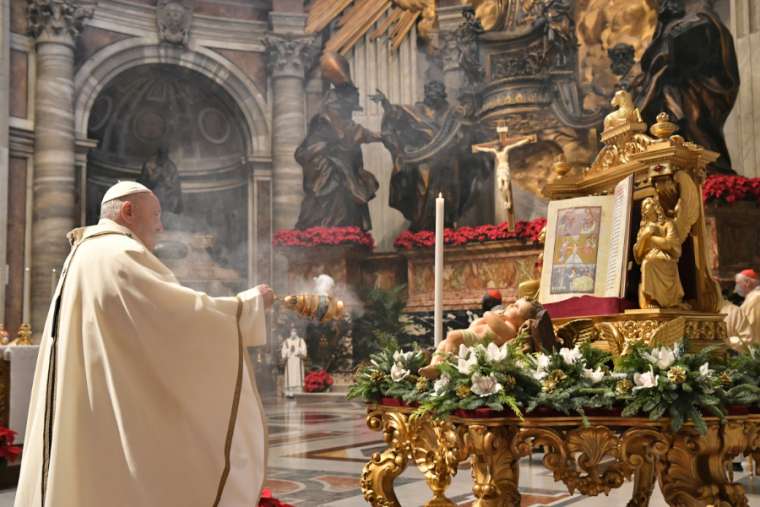Pope Francis celebrates Mass on the Solemnity of the Epiphany of the Lord in St. Peter’s Basilica Jan. 6, 2021. Credit: Vatican Media.
As he celebrated Mass on the Solemnity of the Epiphany of the Lord Wednesday, Pope Francis urged Catholics to devote more time to worshiping God.
Preaching in St. Peter’s Basilica this morning, the pope said that worshipping the Lord was not easy and required spiritual maturity.
“Worshiping God is not something we do spontaneously. True, human beings have a need to worship, but we can risk missing the goal. Indeed, if we do not worship God, we will worship idols — there is no middle way, it is either God or idols,” he said.
He continued: “In our day, it is particularly necessary for us, both as individuals and as communities, to devote more time to worship. We need to learn ever better how to contemplate the Lord. We have somewhat lost the meaning of the prayer of adoration, so we must take it up again, both in our communities and in our own spiritual life.”

The pope celebrated the Mass, which commemorates the Magi’s visit to the Christ Child, at the Altar of the Chair in St. Peter’s Basilica.
Due to the coronavirus crisis, only a few members of the public were present. They sat spaced apart and wearing masks to prevent the spread of the virus.
Before the pope preached, a cantor solemnly proclaimed the date of Easter, as well as other major occasions in the Church calendar, in 2021. Easter Sunday will fall on 4 April this year. Lent will begin on 17 February. The Ascension will be marked on 13 May (Sunday 16 May in Italy) and Pentecost on 23 May. The First Sunday of Advent falls on 28 November.
The Epiphany of the Lord was celebrated on Sunday 3 January in the United States.
In his homily, the pope reflected on “a few useful lessons from the Magi,” the wise men from the East who travelled to see the newborn Jesus.
He said that the lessons could be summed up in three phrases from the day’s readings: “to lift up our eyes”, “to set out on a journey” and “to see”.
The first phrase is found in the day’s first reading, Isaiah 60:1-6.
“To worship the Lord, we first have to ‘lift up our eyes,’” the pope said. “Not to let ourselves be imprisoned by those imaginary spectres that stifle hope, and not to make our problems and difficulties the centre of our lives.”

“This does not mean denying reality, or deluding ourselves into thinking that all is well. No. Rather, it is a matter of viewing problems and anxieties in a new way, knowing that the Lord is aware of our troubles, attentive to our prayers and not indifferent to the tears we shed.”
But if we turn our eyes away from God, he said, we become overwhelmed by our problems, leading to “anger, bewilderment, anxiety, and depression.” It then requires courage to “break out of the circle of our foregone conclusions” and worship God with fresh dedication.
Those who worship discover true joy, the pope said, which unlike worldly joy is not based on wealth or success.
“The joy of Christ’s disciple, on the other hand, is based on the fidelity of God, whose promises never fail, whatever the crises we may face,” he said.
The second phrase — “to set out on a journey” — comes from the day’s Gospel reading, Matthew 2:1-12, describing the Magi’s journey to Bethlehem.
“Like the Magi, we too must allow ourselves to learn from the journey of life, marked by the inevitable inconveniences of travel,” the pope said.
“We cannot let our weariness, our falls, and our failings discourage us. Instead, by humbly acknowledging them, we should make them opportunities to progress towards the Lord Jesus.”
He emphasized that all the events of our life, including our sins, could help us to experience interior growth, provided that we show contrition and repentance.
“Those who let themselves be shaped by grace usually improve with time,” he commented.
The third phrase highlighted by Pope Francis — “to see” — is also found in St Matthew’s Gospel.
He said: “Worshiping was an act of homage reserved for sovereigns and high dignitaries. The Magi, in fact, worshipped the One they knew was the king of the Jews.”
“But what did they actually see? They saw a poor child and his mother. Yet these wise men from far-off lands were able to look beyond those lowly surroundings and recognize in that Child a royal presence. They were able to ‘see’ beyond appearances.”

He explained that the gifts offered by the Magi to the Christ Child symbolized the offering of their hearts.
“To worship the Lord we need to ‘see’ beyond the veil of things visible, which often prove deceptive,” he said.
In contrast to King Herod and other worldly citizens of Jerusalem, the Magi showed what the pope called “theological realism.” He defined this quality as the ability to perceive “the objective reality of things” that “leads finally to the realization that God shuns all ostentation.”
Concluding his homily, the pope said: “May the Lord Jesus make us true worshipers, capable of showing by our lives his loving plan for all humanity. Let us ask for the grace for each of us and for the whole Church, to learn to worship, to continue to worship, to exercise this prayer of adoration often, because only God is to be adored.”
Source: CNA

